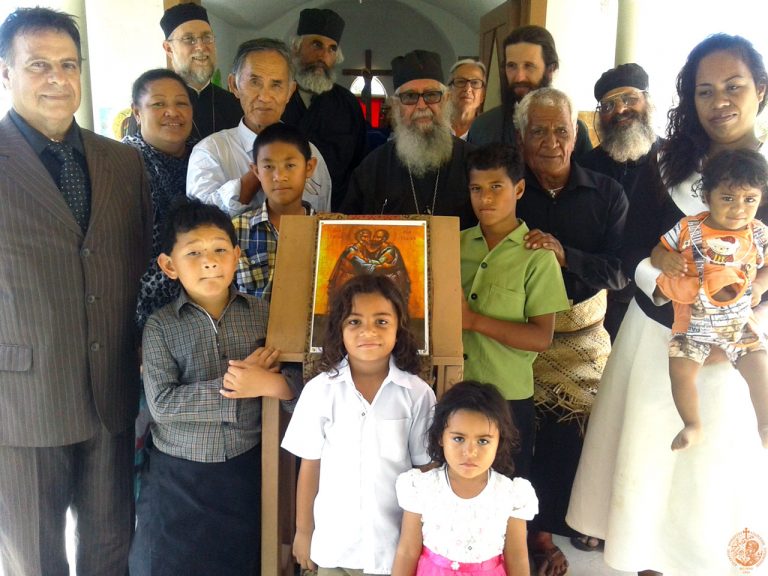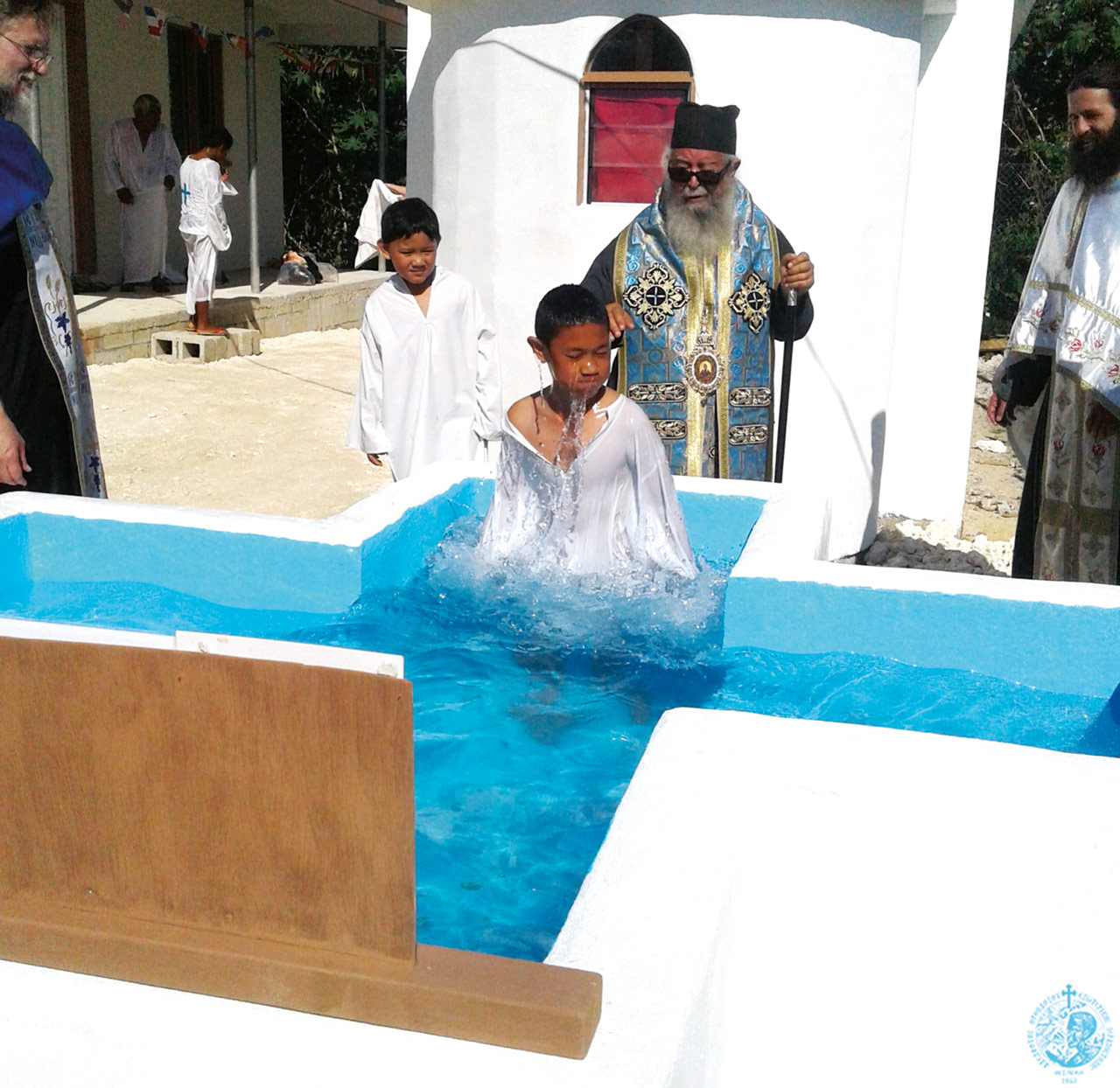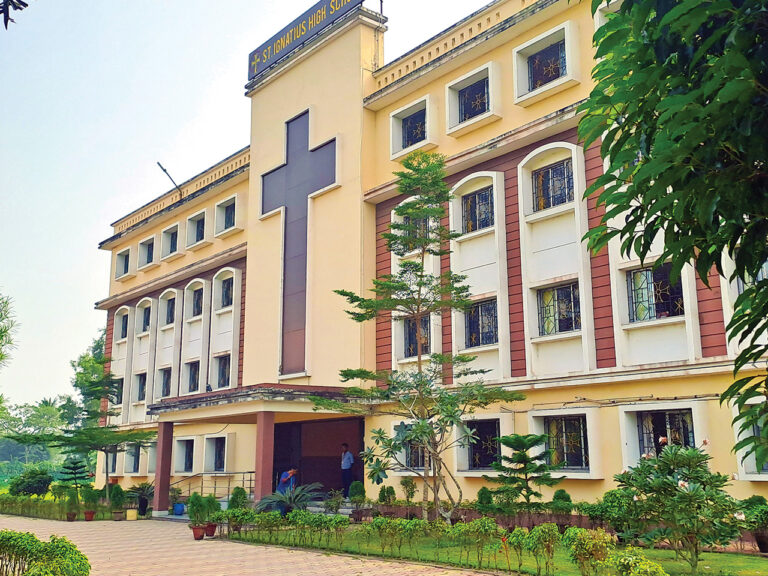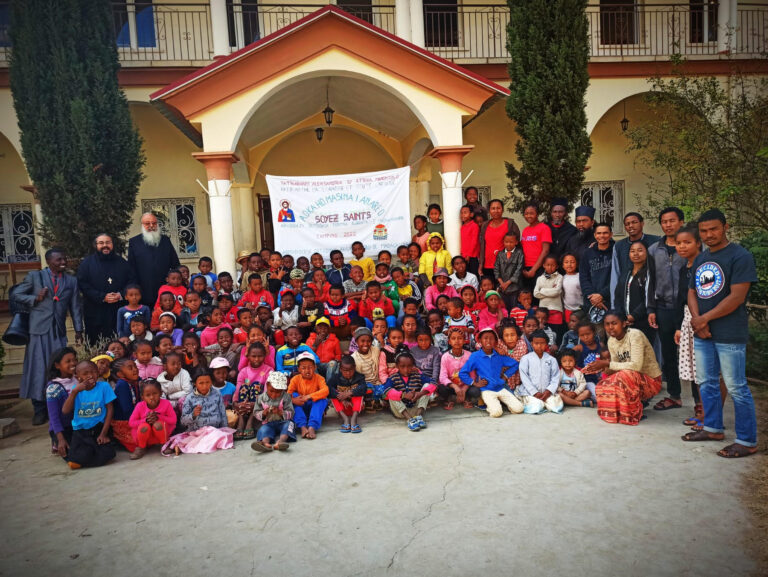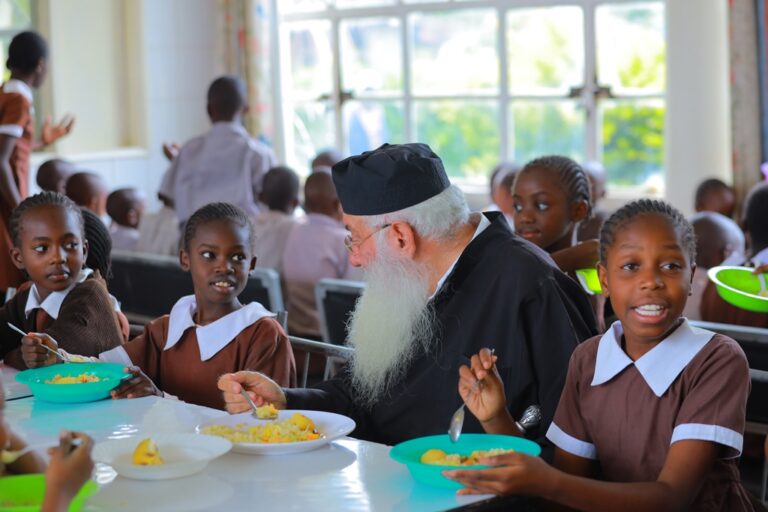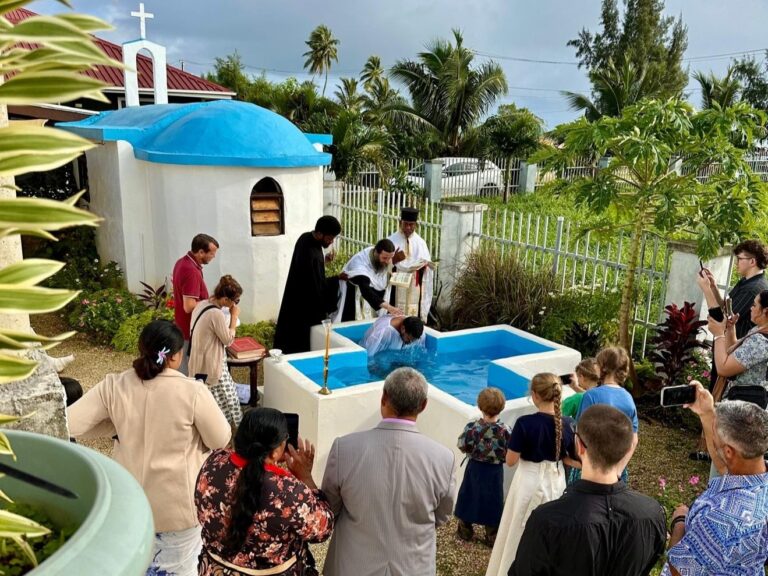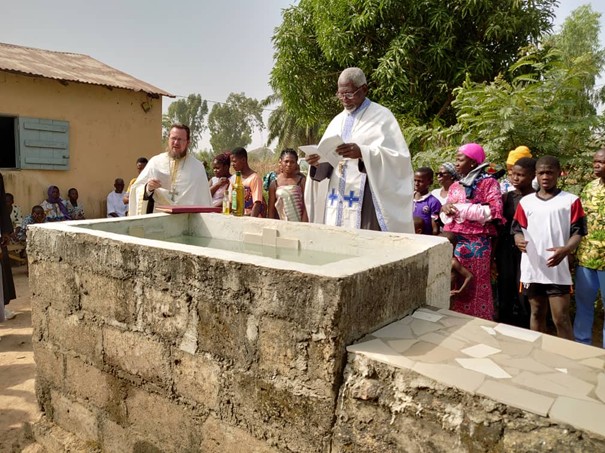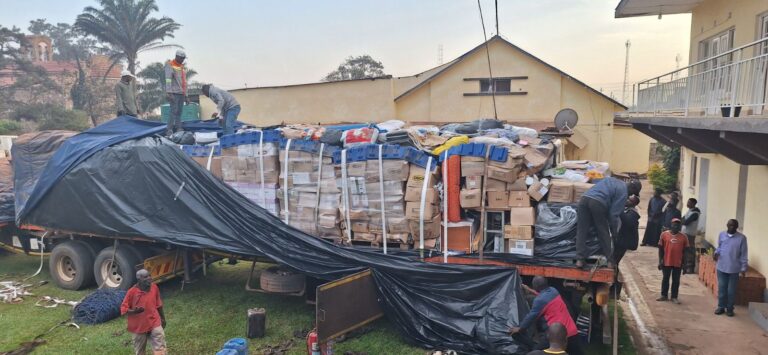Tongan Uranopolitans
Four are the signs of the horizon, four are the holy sacraments celebrated on October 16th in the unadorned chapel of the Holy Apostles of the Glorious and Firstfruits on the island of Tongatapu, in the Fangalotto region of the Tonga Islands. This is where their capital Nukuʻalofa is located. The white and blue colors that dominate the chapel and the Holy Baptistery, which is behind the holy platform, create feelings of joy and hope in every soul that looks hopefully to the sky and prays for the whole world and especially for the suffering Greece. The Holy Apostles and the Holy Baptistery are the labor of faith and piety of the pious monks Arsenios and Savvas from Mount Athos, collaborators of the Mission, and the pilgrim Nicholas, who built them with their own hands.
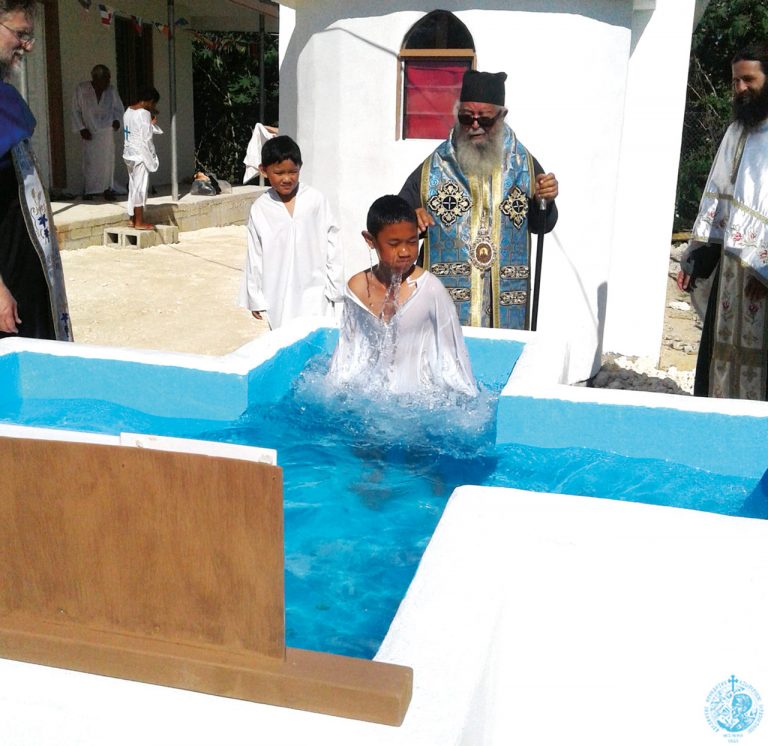 The house of hospitality, which is already ready, and the beautiful great Church of St. George, the Glorious and Trophy-bearing Saint, which has been founded and is still being built, are the result and contribution of devout Christians from Greece, especially from Thessaloniki and Aspropyrgos, and from Australia and America. One had to be here today, Sunday, October 16, to witness with what reverence and simplicity our first Tongan catechumens received the holy sacraments of baptism and anointing, and then the first Holy Communion. This was followed by the first marriage of Constantine and Helen, and the meal of love at which all those present at this great joy were joined “in foolishness of heart” (Prax. 2:46). In externalizing their impressions and feelings, Constantine, who is also a Jew by descent, said that by Holy Baptism he felt that he was born again… This is exactly what the Lord said to Nicodemus: “Except he be born of water and the Spirit, he cannot enter the kingdom of God” (John 3:5). Peter, Verus Tonganus, said that in baptism he gave up his worldly name of Ophisi, and henceforth he will have the heavenly name of Peter. In his simplicity he stated the theological truth that the one baptized in the name of the Holy Trinity ceases to belong to the earth. Henceforth he is a citizen of heaven according to the Apostle Paul, who says, “For mine is in heaven” (Phil. 3:20).
The house of hospitality, which is already ready, and the beautiful great Church of St. George, the Glorious and Trophy-bearing Saint, which has been founded and is still being built, are the result and contribution of devout Christians from Greece, especially from Thessaloniki and Aspropyrgos, and from Australia and America. One had to be here today, Sunday, October 16, to witness with what reverence and simplicity our first Tongan catechumens received the holy sacraments of baptism and anointing, and then the first Holy Communion. This was followed by the first marriage of Constantine and Helen, and the meal of love at which all those present at this great joy were joined “in foolishness of heart” (Prax. 2:46). In externalizing their impressions and feelings, Constantine, who is also a Jew by descent, said that by Holy Baptism he felt that he was born again… This is exactly what the Lord said to Nicodemus: “Except he be born of water and the Spirit, he cannot enter the kingdom of God” (John 3:5). Peter, Verus Tonganus, said that in baptism he gave up his worldly name of Ophisi, and henceforth he will have the heavenly name of Peter. In his simplicity he stated the theological truth that the one baptized in the name of the Holy Trinity ceases to belong to the earth. Henceforth he is a citizen of heaven according to the Apostle Paul, who says, “For mine is in heaven” (Phil. 3:20).
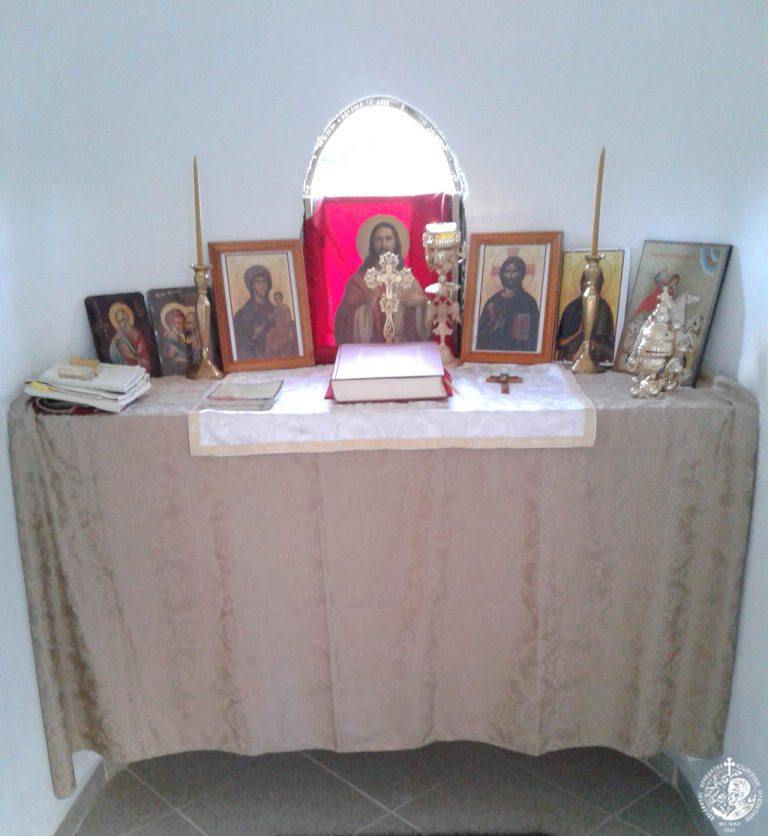 Another presence of Orthodoxy in distant Oceania. The cross of the Lord adorns and sanctifies the breasts, the place and the homes of our newly converted brothers and sisters. The bell of the Holy Apostles is small but its sound, sweet, joyful and moving, spreads as the voice of the Church across the length and breadth of the vast Pacific, inviting every unconverted person to come to the source of truth and life: “Second, all nations know the power of the terrible mystery. “Blessed are those whose iniquities have been forgiven” (Psalm 31:1) through the holy sacraments of Holy Orthodoxy. “As beautiful are the feet of those who proclaim peace and the good things of the kingdom of God” (Rom 10:15). Worthy is the reward of the givers and possessors of the holy churches of God. After Tonga, it is the turn of another island in the South East Pacific, Samoa, which is also under the jurisdiction of the Diocese of New Zealand. God willing, the church of the Holy Apostle and Evangelist John the Theologian, whose “voice has gone out into all the earth”, as well as that of the First Bishops Peter and Paul and all the Holy Apostles, will be built there. ‘Glory to you, O Christ God, the glory of the Apostles, the exultation of the martyrs, whose preaching the Trinity is homogeneous’.
Another presence of Orthodoxy in distant Oceania. The cross of the Lord adorns and sanctifies the breasts, the place and the homes of our newly converted brothers and sisters. The bell of the Holy Apostles is small but its sound, sweet, joyful and moving, spreads as the voice of the Church across the length and breadth of the vast Pacific, inviting every unconverted person to come to the source of truth and life: “Second, all nations know the power of the terrible mystery. “Blessed are those whose iniquities have been forgiven” (Psalm 31:1) through the holy sacraments of Holy Orthodoxy. “As beautiful are the feet of those who proclaim peace and the good things of the kingdom of God” (Rom 10:15). Worthy is the reward of the givers and possessors of the holy churches of God. After Tonga, it is the turn of another island in the South East Pacific, Samoa, which is also under the jurisdiction of the Diocese of New Zealand. God willing, the church of the Holy Apostle and Evangelist John the Theologian, whose “voice has gone out into all the earth”, as well as that of the First Bishops Peter and Paul and all the Holy Apostles, will be built there. ‘Glory to you, O Christ God, the glory of the Apostles, the exultation of the martyrs, whose preaching the Trinity is homogeneous’.
† New Zealand Amphilochius
